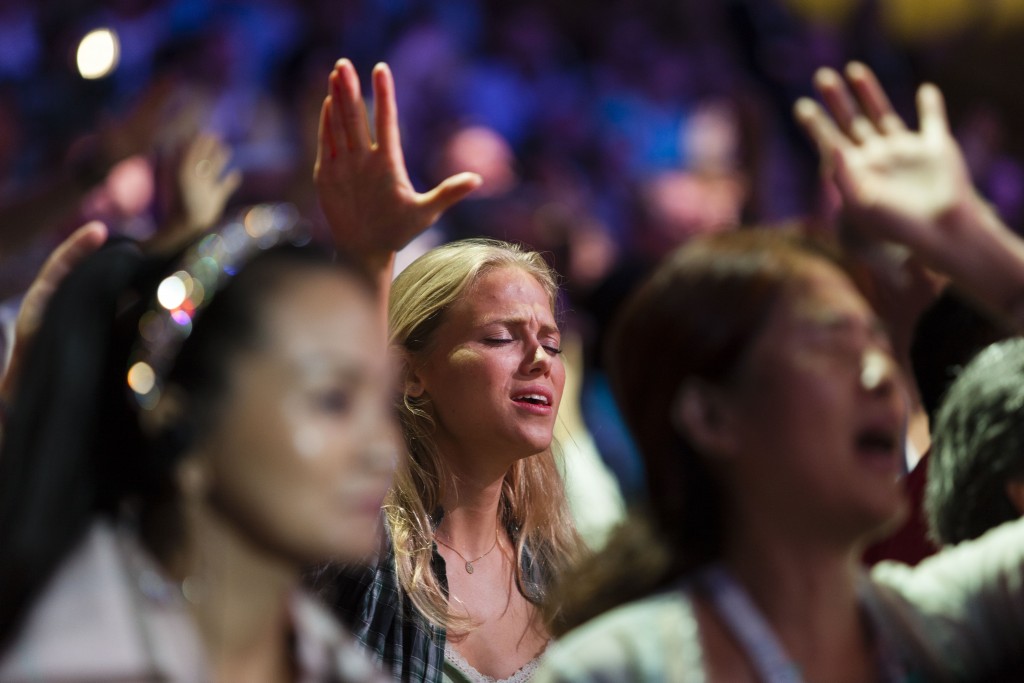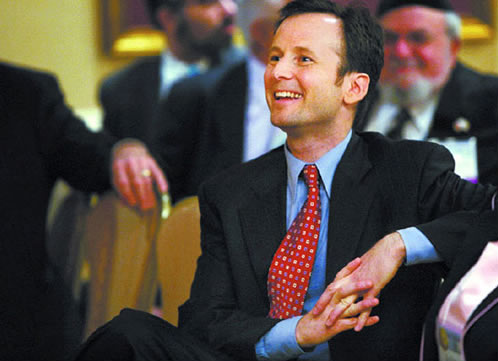Historically, many American Jews have a less than favorable view of Evangelicals. A walk through the minefield of social and foreign-policy questions that could lead to a new relationship.
We live in a world that is hostile to the Jewish people. Few ethno-religious groups have ever been so embattled for so long, having had to endure persecution, intolerance, war, and exile for millennia. This still holds true today, in all its old and new incarnations, particularly as anti-Semitism sweeps across the “tolerant West” with renewed vigor. Following the Holocaust, we questioned how so many could turn a blind eye or, worse, actively participate in the savagery of those dark days. Conversely, we honored the brave souls who rescued Jews from certain death and hailed them as “righteous gentiles.” In either case, one constant remains: Historically our enemies have always outranked our friends, and this is a sobering fact that we rightfully lament. It’s odd, then, that many American Jews are so wracked with ambivalence toward millions of people who are doggedly trying to extend a hand of friendship and offer their support to the Jewish state.
Of course, I am referring to Evangelical Christians; a demographic which comprises nearly 100 million people in the U.S. alone, and whose mere mention invokes reactions ranging from warmth and appreciation to outright repudiation among members of the Jewish community.
For the most part, despite Evangelicals’ support for the Jewish state and desire to embrace the Jewish people, their affection has often largely gone unrequited. In fact, only one-third of American Jews view Christian Zionists in a favorable light. This harsh reality, however, has not deterred Evangelicals from trying to befriend the Jewish people both at home and in Israel. According to a recent Pew poll, 69 percent of Evangelicals view American Jews positively, while 64 percent of American Jews view Evangelicals with skepticism or even negativity. In fact, Jewish Americans trail only atheists in their coolness toward Evangelicals.
What is at the root of this stark imbalance?
The answer is hardly obvious. While divergent theological beliefs certainly play a role, as does Christianity’s history of anti-Semitic transgressions, the root of some American Jews’ modern-day distance from Christian Zionists may actually lie in the two communities’ often polarized political and social ideologies.
On matters of faith, there is no doubt that American Jews, especially those on the liberal end of the religious and political spectrum, are somewhat at odds with Evangelicals. While many Evangelicals, like most Americans in general, support the Jewish State because they believe it to be the morally and geopolitically correct choice, it goes without saying that religious belief plays a meaningful role in this stance and in the Evangelical community in general.
Much of the American Jewish community, however, seems to believe that these basic religious and geopolitical underpinnings are merely a pretense, believing that Evangelicals only support Israel in order to usher in the Second Coming of Christ, and that all Jews who fail to accept Jesus will ultimately be left to perish in an apocalyptic event known to Christians as “End Times.”
While some of these concerns do have a scriptural basis, others do not. For those unfamiliar with Christian eschatology, “End Times” is an apocalyptic period said to immediately precede the Second Coming of the messiah, who for Christians is, of course, Jesus Christ. But there are several eschatological views within Evangelical Christianity, and not all adherents agree on how the messiah will return to Earth and what the circumstances surrounding his return will be. Those who adhere to a dispensationalist view—that is, a more literal interpretation of scripture—are perhaps more likely to believe in a possible Armageddon to come, but they certainly do not comprise all Evangelicals.
Regardless of which theological distinction one follows, an important point all Christians agree on, scripturally speaking and otherwise, is that humans are powerless to influence when and how Jesus’ return will take place.
Christian doctrine rejects the idea that humankind can in any way accelerate or decelerate the onset of the Second Coming through any earthly action of its own—including support for a Jewish state. Indeed, according to Warren Cole Smith, associate publisher of the Christian publication WORLD Magazine and author of A Lover’s Quarrel with the Evangelical Church, “All Christians believe God is sovereign. The understanding of most is that Jesus could return at any time and nothing new or special has to happen [in order to facilitate it].”

Evangelical Christians from around the world sing and recite prayers as they attend the 2013 Jerusalem Chairman’s Conference hosted by the Israel Allies Foundation, at the International Convention Center in Jerusalem, on September 22, 2013. Photo: Flash90
In fact, according to Smith and others leaders, the scriptural basis for Evangelical Zionism, rather than being related to notions of the Second Coming, is found in the words of Genesis 12:3, in which God says to Abraham, “I will bless them that bless you, and curse him that curses you, and in you shall all the families of the earth be blessed.” In addition, there is Psalm 122:6, which instructs worshippers to “pray for the peace of Jerusalem.” Many American Evangelicals believe that America’s own success in the world grows from the role the United States has played in restoring and protecting the homeland of the Jewish people. He who blesses Israel, will be blessed.
Smith adds that, along with a variety of biblical passages urging Christians to care about Israel and the Jewish people, there is also an “emotional attachment” at play. “Evangelicals have a high view of scripture and are very familiar with biblical stories,” Smith explains. Whether it is Jesus walking on the Sea of Galilee or the fact that he was born in Bethlehem and raised in Nazareth, these are “real places and historical events, not abstractions.” With that comes a deep attachment. “I’ve been to Israel twice and it is remarkable. To see [the places] I’ve read about since I was a child. In some cases, to have even walked where Jesus walked.” Smith goes on to explain that, even with modern-day skyscrapers and cell phone towers, much of the landscape of Israel has not changed since ancient times. Being able to connect with the past and with their theological roots in such a poignant and tangible way is of great significance to Christians.
Moreover, Evangelicals acknowledge the fact that Christianity descended from Judaism and, as such, feel they owe the people of Israel a debt of gratitude. Indeed, Evangelicals view themselves as descendants of Abraham, just like their Jewish counterparts.
But there are also far less ancient factors at work. David Brog, Executive Director for Christians United for Israel (CUFI), one of the largest and most active Christian Zionist organizations in the world, believes the Holocaust is another great motivator. “Remorse over the Holocaust is a powerful, palpable motive among our members,” Brog, who is Jewish, explains. “They are outraged that the churches of Europe did so little to save Jews from genocide. They are determined to never again be silent in the face of threats to the Jewish people. They are making good on this vow by speaking out now—when the Jewish state of Israel is threatened with destruction.” Brog said that he finds it “difficult to be cynical” about this Christian desire “to make amends for the past.” And indeed, isn’t this the very response Jews across the world have so long awaited?
But what about conversion? Don’t Christian Evangelicals believe in “spreading the good news,” i.e., the gospel, and encouraging non-believers to accept Jesus as his or her personal savior?
Yes, but. Proselytizing is a commandment for Evangelicals just as much as any of the 613 mitzvot Jews are commanded to observe. Evangelicals believe they are doing a good deed by sharing the gospel of Jesus with others, but that does not mean all Christian Zionists engage in this practice, nor are they instructed to impose their will on others. Indeed, as Pastor John Hagee, the founder of CUFI, wrote in the Jewish newspaper The Forward:
Like all people of faith, we Christians firmly believe that our religion is true. But we also believe in religious freedom and have enormous respect for the Jewish faith. The first rule adopted by Christians United for Israel was that there would be no proselytizing at our events. CUFI exists only to honor and support the Jewish people, never to convert them.
The problem is, though, that even if Evangelical supporters of Israel don’t proselytize, Jews themselves are unaware that evangelical leaders have moved away from the long practice urging their flocks to proselytize in the Jewish community, even discouraging it. And the subtle message of Evangelical theology—that Jews are fallen or destined for Hell if they don’t convert—remains.
While much progress has been made in fostering understanding between the communities, challenges remain, say Christian leaders like Tom Trento, an theologian who frequently leads tours of Israel and organizes interfaith dialogues. Trento believes that every person, regardless of religious affiliation, has his or her own relationship with God and that it is not his place to interfere. “Only God can judge” in this case, he says.
Trento’s main concern, as with many other Christian Zionists, is not the evangelistic component of his faith, but rather the pressing matter of the threat to security and religious freedom posed by Islamic jihad. “We are all living in a house that’s on fire and we [Christians and Jews] are arguing over details of scripture,” he says. “Let’s put the fire out first.” Like many other Evangelicals, Trento believes that Christians’ and Jews’ first priority should be to “stand shoulder to shoulder” and fight those who want to harm the U.S. and Israel. Likewise, contrary to the fears of many liberal Jews, Christian pro-Israel activism has not come with any quid-pro-quo expectation from Evangelicals that American Jews would suddenly flock to pro-life rallies, or support prayer in public school, or make common cause on other domestic issues.
Smith offers additional insight into the evangelistic component of his faith, saying it stems from Evangelicals’ love for all people, “Jews and gentiles” alike. It is because of this enthusiasm, he maintains, that a contingent of Evangelicals seeks to spread the gospel as actively as they do. Is spreading this good news and hoping others will willingly embrace Jesus a part of the faith? Absolutely. But Smith is quick to clarify that “proposing ideas” is very different from “imposing” them. Never at any time, he asserts, would a true Evangelical “force or intimidate” a conversion. “To anyone who has ever witnessed that,” Smith says, “I would say that the person is not living up to our faith’s true ideals and tenants.”
Brog agrees, and believes that, at its core, American Jews’ concerns about Christian Zionists typically fall into two categories: “The imaginary and the merely unfair.”
“The imaginary,” he says, concerns “two alleged Christian motives for supporting Israel: Speeding the Second Coming of Christ and converting Jews in the here and now. These motives exist only in the minds of those who have never met a real Christian Zionist.”
This brings us to the heart of the matter and perhaps the most substantive reason for the American Jewish community’s overwhelming distaste for Christian Zionists: Politics and religion. There is little room for doubt that political and social ideologies that are—in general—diametrically opposed pose the largest obstacles to forging friendships between American Jews and Christian Zionists.
The statistics bear this out in dramatic fashion. According to a Pew survey, American Jews are “among the most strongly liberal, Democratic groups in U.S. politics.” In fact, roughly 70 percent of American Jews identify with the Democratic Party and American liberalism. “There are more than twice as many self-identified Jewish liberals as conservatives, while among the general public this ratio is nearly reversed,” the Pew survey explains. In other words, Jewish Americans are disproportionately liberal in relation to the rest of the country and the general public. Evangelicals, by contrast, tend to be conservative in their social and political views.
Interestingly, the only Jewish group that does not identify itself as liberal or Democratic in its political leanings is the Orthodox community, indicating that a strong religious identity plays a role in American Jews’ political leanings, including their views on Israel.
Painting a more nuanced picture of American Jewish life and attitudes, a separate Pew poll reveals that “the number of Americans with direct Jewish ancestry or upbringing who consider themselves Jewish, yet describe themselves as atheist, agnostic, or having no particular religion, appears to be rising.” In fact, for a group that, by its very nature, is as much a religion as it is an ethnicity, only 15 percent of American Jews today say that being Jewish is “a matter of religion” at all, while a majority of 62 percent say that being Jewish is “mainly a matter of ancestry and culture.”

Participants of a delegation of Evangelical motorcyclists from the United States arrive at the Western Wall in Jerusalem, November 6, 2011. The organization Mission M25, consisting of Evangelical pastors and military veterans, ride through Israel on a nine-day motorcade on Harley Davidson motorbikes. Photo: Uri Lenz/ Flash 90
This presents a staggering change, because 93 percent—virtually all—of Jewish members of the Greatest Generation identified their Jewishness as intricately tied to their religion. Today, 32 percent of Jewish Millennials describe themselves as having no religion at all and do not see themselves as a meaningful part of the American Jewish community. Roughly one-third of American Jews identify with the Reform movement while, trailing behind, 18 percent identify themselves as Conservative and only 10 percent as Orthodox.
This data is critical to understanding the difference in worldviews between Evangelicals and the majority of American Jews, who continue to identify politically as Democrats. While there are certainly secular Jews who staunchly support Israel, statistically speaking, there is an undeniable correlation between American Jewish religious identity—or lack thereof—and attachment to the Jewish state. Of those surveyed by Pew, 55 percent of non-religious American Jews admitted they are “not at all attached” to the State of Israel, while only 12 percent consider themselves “very attached.” On the other hand, 76 percent of religious Jews consider themselves very or somewhat attached to Israel.
So, if religion and regard for Israel as the ancient and ancestral homeland of the Jewish people are not what “being Jewish” means to many American Jews, at least half of those non-affiliated, what does being Jewish mean to them?
According to Pew, when that segment of Jewish society was asked “what it means to be a Jew,” a remarkable 73 percent chose “remembering the Holocaust.” The second and third most common answers were “behaving morally” (69 percent) and “working for justice and equality” (56 percent). For this subset of Jews, “being religious” or “caring about Israel” did not register as aspects of one’s “Jewishness” until much further down the list.
It makes some sense, then, that when asked in various surveys about overall support for Israel in the U.S., Evangelicals come out ahead of their Jewish counterparts. While according to one recent survey, 31 percent of American Jews believe there is not enough support for Israel in the U.S., nearly half of Evangelicals polled would like to see greater support for the Jewish state.

An Evangelical supporter of Israel waves during the annual parade in Jerusalem, marking the Jewish holiday of Sukkot, October 4, 2012. The parade take place every year during Sukkot, with many delegations from Israel and abroad. Photo: Yonatan Sindel / Flash90
The topics of foreign policy and Israel are not where these differences begin and end. In fact, as communities, American Jews and Evangelicals hold disparate views on many socio-political issues of our time. Evangelicals, by and large, are more inclined to support conservative fiscal and foreign policies, and oppose abortion and the legalization of same-sex marriage. According to polls, Evangelicals are also more inclined to oppose stem cell research and challenge theories of climate change and evolution.
When asked how he might respond to Jewish critics who cite Evangelicals’ views on various social and political issues as a reason for not coming together on the topic of Israel, Smith says he simply does not “know how to argue against that kind of straw man logic.”
Just because you disagree with me on the issue of same-sex marriage, therefore you are unable to agree with me on anything else? Everything I say and believe then is wrong? If you are going to allow my position on abortion, for instance, to determine your posture towards me in every other area of life, there is a strong part of me that feels I am [engaging] a person for whom logic and reason … won’t have much of an impact.
On the other hand, if you’re saying that there are members of the Jewish community who would like to accept the support of Evangelicals on Israel, but are afraid [that through association with us] they will then also be branded as supporters of traditional marriage or the pro-life [movement], I’d say to them: “You have nothing to fear.”
Smith believes that, while Evangelicals hold fast to their deeply held beliefs—just like American Jews who support the separation of church and state or are pro-choice—there is no reason not to come together on one issue they can agree on. Evangelicals have never asked American Jews to accept “all of Evangelicals’ beliefs,” he says. “We are simply offering our help and support for Israel.”
Smith asks that American Jews view their Evangelical counterparts as “co-belligerents”—friends who band together to fight for a common goal or against a common enemy—on the topic of Israel, even if they cannot agree on much else. “I’d encourage the Jewish community to view us as co-belligerents with them on this one point,” he says. “They don’t have to accept everything we believe, but we are offering our support for Israel with no strings attached.”
In powerful terms that could equally come from any pro-Israel liberal, Smith explains that while he’s “not pretending that Israel is perfect, just like the U.S. is not perfect,” Israel is a “force for good in this world.” He believes that Israel’s “democracy, with its rule of law, freedom of speech and assembly, and spirit of entrepreneurship, are all virtues we honor and believe in here in the U.S. as well. Israel is the only democracy in the region. It is a place that, I believe, has earned the support of not just Evangelicals, but of all Americans.”
David Brog agrees, explaining that many of the criticisms leveled by American Jews against the Evangelical community are “unfair” and have a great deal to do with politics. “Christian Zionists are often conservative when it comes to both social issues at home as well as Israeli politics abroad,” he says. But even if one disagrees with these views, “they are hardly disqualifications. Orthodox Jews quite often share these conservative views, but no one is claiming that their support for Israel is illegitimate because of it.”
While supporters of Christian Zionists believe that tolerance, despite disparate political leanings, should trump all when it comes to joining hands on the topic of Israel, for some American Jews, what they see as Evangelicals’ “backwardness” on social issues acts as an impediment to a deeper relationship.

3,000 Evangelical supporters of Israel from all over the world attend a festival at the International Conference Center in Jerusalem, which ended with a sermon by the South Korean preacher Jaerock Lee, who claims to have the power to heal the sick through the power of prayer and belief. Photo: Miriam Alster / Flash90
From the late Reverend Jerry Falwell to Reverend Franklin Graham and others, there is no doubt that some Evangelical leaders have made remarks many in the mainstream find offensive. For example, Graham has been open about his disapproval of “homosexual lifestyles”; while Falwell, despite his staunchly pro-Israel record, once stated that the Antichrist was likely alive and “a Jewish male.”
While incendiary, hurtful comments are unacceptable, those remarks are equally offensive to many Republicans today, as well as Democrats, and America’s Jews must be wary writing off an entire community on the basis of isolated comments made by some members of the Christian community. Would the American Jewish community be as quick to paint every Muslim as anti-Semitic on the basis of the Quran and Hadith’s anti-Semitic verses, like equating Jews to descendants of apes and pigs? Or suggest that all Muslims are terrorists because of the carnage committed by radical Islamists worldwide?
Brog’s response on the subject is straightforward: “I have heard some Jews make some ugly comments about homosexuals, Arabs, and Christians. Does that mean that all Jews are bigots? Of course not. We have to stop judging people by their group affiliation. We must start judging people by their actions.”
The Jewish people, despite our resilience in the face of adversity, our strong moral compass, our commitment to education and justice, our regard for compassion and family values, and the very tangible contributions we have made to the societies in which we’ve lived, have generally been viewed as outsiders. In part, this is by choice. After all, as a people, we are charged with retaining our traditions, faith, and uniqueness, whatever the reaction of our host society. Conversely, even when we have tried with all our might to assimilate, we have always been set apart and had few, if any, real friends.
This harsh reality was even acknowledged by our own vice president, Joe Biden, during a Rosh Hashanah gathering he and his wife hosted in September 2014. Biden recounted that the late Israeli Prime Minister Golda Meir once explained to him that the Jews “secret weapon” was the fact that they have “no place else to go.”
Biden, whose comments were widely shared after being featured in an April article for The Atlantic, underscored an often unspoken reality: Perhaps American Jews should not rely too heavily on their current standing in American life as an automatic safeguard. “Folks,” Biden said to those gathered,
There is no place else to go and you understand that in your bones. You understand in your bones that no matter how hospitable, no matter how consequential, no matter how engaged, no matter how deeply involved you are in the United States … there’s only one guarantee. There is really only one absolute guarantee, and that’s the State of Israel.
The Jewish community worldwide has good reason to be self-protective, and that includes embracing a healthy level of skepticism when it comes to would-be friends and supporters of the Jewish state, which is our “only place to go.” After all, history has not been kind to us. But, as Brog points out, “we Jews are often prisoners of our past.”
We are all raised with a series of horror stories about how the Christians treated us for centuries in Europe. Thus, we find it hard to believe that these Christians “all of a sudden” like us and support us. The Christians who support Israel in America today have little in common with those who ran the Inquisition centuries ago. Just because our bias springs from past persecution does not mean that it’s justified.
Indeed, any thoughtful person is right to be skeptical, but what happens when that skepticism overrides logic and fairness? What happens when, on the one hand, we seek to sit at the table and engage in dialogue with the likes of Iran; but on the other hand, refuse to afford the same consideration to our Christian neighbors?
As Jews, we tend to embrace contemporary liberal values, scold others for the crime of “stereotyping,” and caution against “making blanket statements about entire groups based on the actions of a few.” Yet we fail to apply the same logic in dealing with the Evangelical Christian community. Perhaps it is time to accept the friends we always wished we’d had.
![]()
Banner Photo: Yossi Zamir / Flash 90






